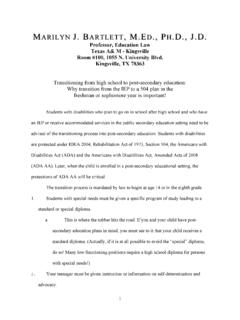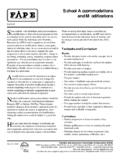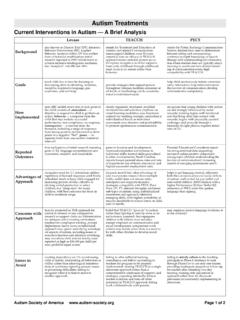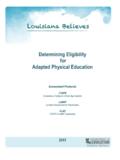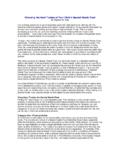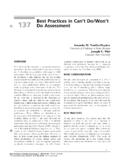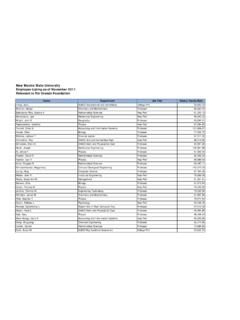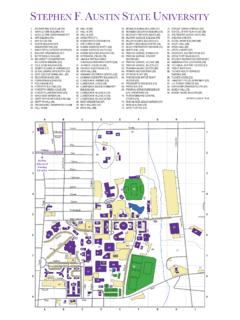Transcription of Involvement of Adult Siblings of People with …
1 Involvement of Adult Siblings of People with developmental disabilities in future planning IDHD The university Center for Excellence in developmental disabilities for the State of Illinois Institute on Disability and Human Development planning for the future is a central task for aging Adult Siblings of People with developmental disabilities and their families. Adult Siblings of People with developmental disabilities are the most likely People to be involved in the future as parents age and can no longer provide care. Yet many parents are reluctant to involve their children with or without disabilities in future planning (Heller & Caldwell, 2006). This study asks: 1) To what extent are Siblings involved in future planning ?
2 2) What factors contribute to sibling Involvement in future planning ? 3) What factors contribute to sibling expectations of being a primary caregiver? 4) What are the concerns of Siblings for the future ? and 5) What supports do Siblings need? We surveyed Siblings through an online sibling support group and sibling conference. The 139 Siblings who responded were predominately sisters (93%) who were highly educated (76%) with most (70%) living within an hour of their brother or sister with a disability. The variables addressed were respondents demographics (age, gender, ethnicity, educational level, and Activities of Daily Living and gender of the person with a disability); childhood emotional reactions; distance between Siblings ; Involvement in disability activities; reciprocal support; sibling relationship Involvement ; and caregiving burden and satisfaction.
3 sibling Involvement in future planning Few families in this study made residential (32%), guardianship (39%), or financial plans (44%) or created a letter of intent, a non-legally binding planning document (44%). Only 32% of families had identified a future caregiver. Siblings who were most involved in future planning were those who were older and were already involved in disability related activities. Whether or not families had completed plans, Siblings were most likely to be involved in identifying future caregivers and in making residential plans. Siblings were less likely to be involved in formal tasks ( , establishing a special needs trust, creating a letter of intent, and establishing powers of attorney for their Siblings with disabilities ).
4 Completed Tasks and sibling Involvement38%26%21%38%46%54%48%44%44%39 %32%32%0%20%40%60%80%100%Discussed plans withsibling with a disabilityM ade financial plansCreated letter o f intentEstablished legalguardianshipIdentified future caregiverM ade residential plans% Families whocompleted task% Siblings involvedDISABILITY RESEARCH BRIEF Vol. 2, Issue 2 June 2006 I fear that I won t be able to be there for him and my family because we live far away. Rehabilitation Research and Training Center on Aging with developmental disabilities , university of Illinois at Chicago Tamar Heller, , and John Kramer, 1640 West Roosevelt Road, Room 538 Department of Disability & Human Development, College of Applied Health Sciences university of Illinois at Chicago, Chicago, IL 60608 Funding for this project was provided through the Rehabilitation Research and Training Center on Aging with developmental disabilities , Na-tional Institute on Disability and Rehabilitation Research (Grant # H133B031134) I am not informed of all her doctors and medications.
5 If something were to happen to my mother, these services may be interrupted. Personal costs: financial, time, relations with spouse/partner Availability of services (housing, benefits, recreation, respite, transportation) Dividing responsibility among family sibling health, safety, and happiness Death of parents: Worry about future responsibilities Making sure sibling voices are heard Their own death Helping from a distance sibling Expectations of Being future Primary Caregivers About 36% of the sibling respondents expected that they would eventually become the primary caregivers of their sibling with a disability. The non-disabled Siblings were more likely to expect this role if their sibling with a disability lived closer to them and was a female.
6 The non-disabled Siblings were also more likely to expect this role if they were more involved in disability activities, had more contact with their sibling , and felt greater satisfaction in providing care for their sibling with a disability. Concerns of Siblings for the future Siblings reported the following areas of concern for the future of their brother or sister with a disability: Implications for Policy and Practice with the aging of parent caregivers, professionals will be increasingly working with Siblings , a constituency that to date has received fewer supports. Our study revealed that many Siblings yearn for greater Involvement in the lives of their Siblings with disabilities , but need more information, networking opportunities, and supports.
7 Siblings want to be included in programs designed to help families of People with disabilities . They want more psycho-educational groups, greater use of internet support groups for long distance Siblings , and more information on future planning to effectively transition financial, residential, and leisure responsibilities from parents to sibling caregivers. In its ongoing effort to meet these supports needs, the Rehabilitation Research and Training Center on Aging with developmental disabilities along with The Arc is conducting a series of workshops on future planning for Siblings and promoting state-wide and national sibling conferences and leadership networks. For more information on future planning for individuals with developmental disabilities visit the Rehabilitation Research and Training Center on Aging with developmental disabilities Visit for an online discussion group for Adult Siblings of People with developmental dis-abilities Heller, T.
8 , & Caldwell, J. (2006). Supporting Aging Caregivers and Adults with developmental disabilities in future planning . Mental Retardation, 44(3), 189-202. I want us to be invited to meetings, and our thoughts and ideas respected. I want Adult Sib support groups just like their parents have! I think my family needs to start making some definite plans of what will happen if there is an emergency. Who will look after my sister; where will she go; and who will take over responsibilities?
